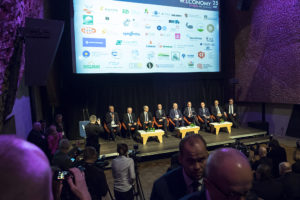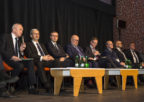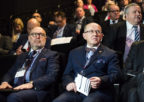“Economic situation of Poland in comparison to the European Union and the world” is the motto of this year’s “Welconomy Forum in Toruń” which took place on 12 and 13 March 2018 in the Cultural and Congress Center Jordanki in Toruń. Professor Henryk Skarżyński was among a large group of distinguished experts in the field of economics, representatives of the government, business and science that took part in the Forum. The participants included, among others, prof. Jerzy Buzek, former Polish Prime Minister and President of the European Parliament; dr Jerzy Kwieciński, Minister of Investment and Economic Development; Krzysztof Tchórzewski, Minister of Energy; Paweł Borys, President of the Polish Development Fund; Peter Frans Gontha, Ambassador of Indonesia; Otylia Jędrzejczak, Olympic champion in swimming, as well as Andrzej Strejlau, former coach of the Polish national football team.
 In the opening speech at the “Welconomy Forum in Toruń”, the hosts emphasised the fact that the economy can be considered from two perspectives, the macro and micro perspective. As far as the former is concerned, the situation looks positive: GDP is rising at one of the highest rates when compared to other European countries. All the components of GDP are also growing. What is more, the unemployment rate is record low. Small-sized enterprises, however, expect the state to “stay away from their business”, which is an extremely difficult task in the case of the model of the so called “administrative-welfare” state. Nevertheless, as proposed in the next year’s budget, the expenditure on state administration will be subject to decrease.
In the opening speech at the “Welconomy Forum in Toruń”, the hosts emphasised the fact that the economy can be considered from two perspectives, the macro and micro perspective. As far as the former is concerned, the situation looks positive: GDP is rising at one of the highest rates when compared to other European countries. All the components of GDP are also growing. What is more, the unemployment rate is record low. Small-sized enterprises, however, expect the state to “stay away from their business”, which is an extremely difficult task in the case of the model of the so called “administrative-welfare” state. Nevertheless, as proposed in the next year’s budget, the expenditure on state administration will be subject to decrease.
Professor Henryk Skarżyński took part in the plenary inaugural session of the “Welconomy Forum” opened by prof. Jerzy Buzek, PhD, Chairman of the Committee on Industry, Research and Energy of the European Parliament, Prime Minister of the Republic of Poland in the years 1997-2001 and President of the European Parliament in the years 2009-2012. The debate was hosted by prof. Michał Kleiber, former president of the Polish Academy of Sciences, currently the Vice President of the European Academy of Sciences. The session was also attended by dr Jerzy Kwieciński, Minister of Investment and Economic Development; Krzysztof Tchórzewski, Minister of Energy; Paweł Borys, President of the Polish Development Fund; dr Marek Cywiński, Chief Executive of Kapsch Telematic Services; Krzysztof Krystowski, Vice President of Leonardo Helicopters, owner of PZL Świdnik S.A., as well as media representatives including Sławomir Jastrzębowski, Editor-in-Chief of “Super Ekspress” and Tomasz Sakiewicz, Editor-in-Chief of “Gazeta Polska”. The participants in the Forum discussed the economic situation of Poland in comparison with the European Union and the World.
Public health sector is an utterly significant element of the Polish economy. By restoring hearing in thousands of patients-employees, professor Skarżyński contributes to its development to a great extent. During the debate, professor Skarżyński stressed that unfortunately there is no country in the whole world which may boast a health care system that would satisfy all needs. – And yet, the Polish health care system, which is not best subsidised, still has many achievements, also globally. We have a great number of wonderful doctors in our country as well as centres where pioneering surgical procedures are carried out in various fields of medicine, an example of which is the World Hearing Centre in which the greatest number of surgeries treating hearing disorders daily have been performed for 15 years, which is several hundred percent more procedures than carried out in the largest global centres. Our patients are the first or among the first in the world to have access to the latest technologies. It is crucial to talk about it so that the public is aware of the fact that the Polish health care sector is also facing something positive.
During the debate prof. Skarżyński also addressed the necessity to perform hearing screening tests both in Polish children as well as within the framework of the hearing screening programs implemented by the Institute on 4 continents.
“Strategy for the development of the Polish economy – perspectives and conditions” is the motto of the second debate attended by prof. Henryk Skarżyński as well as dr Jerzy Kwieciński, Minister of Investment and Development; Paweł Borys, President of the Polish Development Fund; dr Marek Cywiński, Chief Executive of Kapsch Telematic Services; Krzysztof Krystowski, Vice President of Leonardo Helicopters, owner of PZL Świdnik S.A.; dr Jakub Skiba, President of Polska Grupa Zbrojeniowa S.A.; and Janusz Władyczak, President of Korporacja Ubezpieczeń Kredytów Eksportowych S.A. The meeting was hosted by Tomasz Sakiewicz, Editor-in-Chief of “Gazeta Polska”. Professor Skarżyński discussed the development of the Polish health care sector: – When thinking about the development of the Polish health care sector, which is an industry in the case of which the annual expenditure amounts to approx. 130 billion zlotys in the public and private segment, the changing needs of the ageing society should be taken into consideration. Therefore, the Polish school of rehabilitation needs to be developed in the first place: in health resorts or health care centres for the elderly – said prof. Skarżyński.
The third debate, which took place with the participation of prof. Skarżyński, was entitled “Challenges of contemporary medicine”. It was the only panel during this year’s Forum devoted entirely to the field of medicine. The meeting was hosted by Jakub Szulc, Secretary of State in the Ministry of Health in the years 2008 – 2012. The debate was attended by Waldemar Kraska, Senator of the Republic of Poland, Chairman of the Health Committee; prof. Jacek Kubica, MD, PhD, Vice-Chancellor for Scientific Research at the Nicolaus Copernicus University; Marcin Maruszewski, MD, PhD, Head of the Central Clinical Hospital of the Ministry of the Interior and Administration in Warsaw; Piotr Nowicki, MD, PhD, Chancellor’s Representative for organisation and coordination of oncology at the Medical University of Warsaw; Marek Woch, Representative of the Management Board of the National Health Fund.
In his opening speech, Jakub Szulc emphasised several most significant aspects of the development of medicine in Poland, at the same time stressing the importance of the constantly increasing processing power of computers which provides an opportunity to discover the potential of human’s DNA at an increasing rate, thereby allowing customisation of therapy to individual patient needs and development of targeted treatment.
– There is huge potential in the seven billion mobile phones that are in the possession of people all over the world, as well as in the three billion of Internet connections. This technological progress allows not only broad exchange of information, including medical information, but it also enables, above all, testing and implementation of applications by means of which doctors can check how their patients feel. This is a great potential for telemedicine – added Jakub Szulc.
The first in the world National Network of Teleaudiology served as an excellent example of the use of the potential of teleinformation in medicine. Professor Skarżyński, who is its originator and developer, saw the advantages and benefits of digital technologies and the technological progress in its broadest sense as early as several years ago.
– For 18 years we have been developing telediagnostics, and for 14 years we have been improving telerehabilitation and telefitting, that is remote control of the function of a hearing aid and supervision over the activity of an implant performed as close to the place of patient’s residence as possible. These schemes are carried out within the framework of the activity of the Institute of Physiology and Pathology of Hearing. It is difficult to imagine our daily functioning without making use of the potential of telemedicine – said prof. Skarżyński – we need to start taking advantage of telemedicine in our country on a wider scale so that the costs of treatment of many patients can be reduced. Telerehabilitation which our patients use in their homes without having to travel with children halfway across the country to attend rehabilitation sessions, is a great example of how the said costs can be lowered. We have perversely called this program “Home Rehabilitation Clinic” so that our patients become mentally used to the fact that the best place for their rehabilitation is their own home.
Professor Skarżyński also stressed that at present telemedicine provides, but is not limited to, great diagnostic and rehabilitation opportunities. Taking the fact of the ageing society into account, it should also enable monitoring of many vital signs of patients. – Unfortunately, the initial costs of launching and implementing, for example, an application or a program are perceived as higher compared to the standard medical consultation. And this problem needs to be considered on a global scale since it is no secret that patients suffering from chronic diseases require not a single visit to the doctor’s office but a whole range of consultations with different specialists. As a result, this cost, taken as a whole, is much higher. – said prof. Skarżyński.
In the World Hearing Centre, modern telemedicine also allows the performance of large-scale hearing screening programmes. Since the late 1990s, a total of over 1 million hearing screening tests have been carried out within the framework of several dozen programmes and projects conducted by local governments, nationwide as well as internationally. Analysis of the obtained results showed that hearing disorders of various types that affect everyday functioning of a child may be observed in every fifth or sixth pupil in the age group in question, and this is a serious health and social problem. As of the beginning of the 2017/18 school year, the Institute of Physiology and Pathology of Hearing commenced the subsequent hearing screening programmes which this time will embrace the Mazovia Region. It will be the first in the world country region in which the entire population of children starting school education will be subject to research. The idea of hearing screening tests in children is promoted by the Institute’s team not only in Europe but also in other parts of the world. This applies, in particular, to developing countries in which the level of development of medicine and prevention is lower since these countries can benefit most from the knowledge, experience and best practices provided by specialists from Poland.
Thanks to the involvement of prof. Henryk Skarżyński as well as members of the team of the World Hearing Centre, also the participants in the Forum had an opportunity to have their hearing examined for free in the Mobile Hearing Centre located in front of the conference centre.
– I am extremely glad that prof. Henryk Skarżyński took part in our Forum, not only because he has come here accompanied by his team of specialists in hearing disorders, not only because we have organised a discussion panel together, but also because he is a representative of the Polish success on the international front. I would love to persuade all the Poles, who are ambitious and wise, to believe that we can conquer the world, not necessarily being backed up by lots of money – pointed out Jacek Janiszewski, organiser of the “Welconomy Forum” in Toruń.
The Forum was also attended by Associate Professor, dr hab. n. med. Piotr H. Skarżyński, who actively participated in the debate concerning “The impact of science on the innovative economic development of the country”. In the debate, which was hosted by dr Tomasz Marcysiak, lecturer at the School of Banking in Toruń, also took part prof. Aleksander Bobko, Undersecretary of State in the Ministry of Science and Higher Education; prof. dr hab. Leszek Dziawgo, Head of the Department of Financial Management, Faculty of Economics and Management at the Nicolaus Copernicus University in Toruń; dr Marcin Kilanowski, Head of the Academic Entrepreneurship Incubator at the Nicolaus Copernicus University in Toruń, Vice President of KPOP Lewiatan; prof. Michał Kleiber, MD, PhD, Msc., Polish Academy of Sciences; prof. Henryk Skorowski, MD, PhD, former Rector of the Cardinal Stefan Wyszyński University in the years 2008-2012; prof. Marek Stankiewicz, MD, PhD, Rector of the School of Banking in Toruń, and Kamil Wyszkowski, Chief Executive of UN Global Compact Poland.
The jubilee Welconomy Forum was a meeting of over 2000 representatives of business, politics, local governments and the media, and thanks to the presence and active participation of such specialists as prof. Henryk Skarżyński, it has also become a platform for the exchange of ideas and experience in the field of science, medicine in particular.








